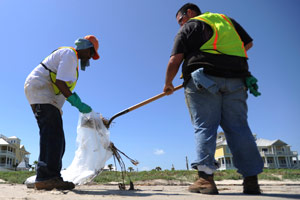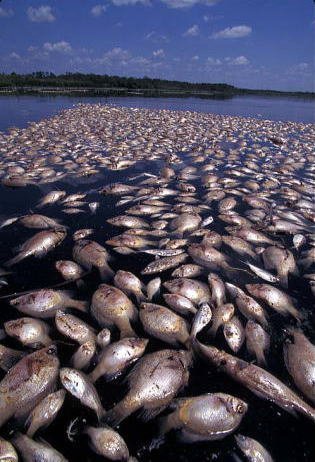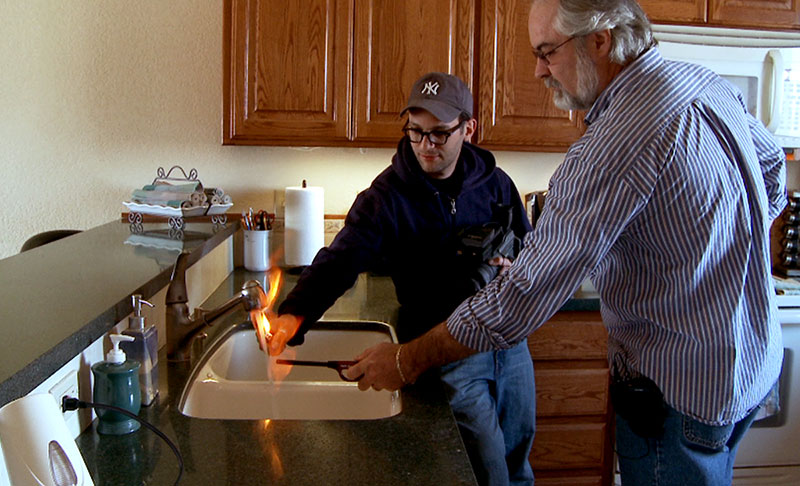"Giving Up Faith": The EPA, Dispersants, and the Commons in Chains
 The great environmental activist Derrick Jensen, in an article titled "Beyond Hope," published in the May/June 2006 issue of Orion Magazine, lamented,
The great environmental activist Derrick Jensen, in an article titled "Beyond Hope," published in the May/June 2006 issue of Orion Magazine, lamented,

 The great environmental activist Derrick Jensen, in an article titled "Beyond Hope," published in the May/June 2006 issue of Orion Magazine, lamented,
The great environmental activist Derrick Jensen, in an article titled "Beyond Hope," published in the May/June 2006 issue of Orion Magazine, lamented,
Submitted by Anne Landman on
Nobu Su, the wealthy owner of TNT shipping, had a great idea: convert a supertanker into a giant skimming vessel that
Submitted by Steve Horn on
 Reporter Miriam Wang of the ProPublica blog points out that although seafood from the Gulf has been tested for oil content, testers at the Food and Drug Administration (FDA) neglected to test whether the chemical dispersant applied to the oil in the Gulf could be found in the seafood.
Reporter Miriam Wang of the ProPublica blog points out that although seafood from the Gulf has been tested for oil content, testers at the Food and Drug Administration (FDA) neglected to test whether the chemical dispersant applied to the oil in the Gulf could be found in the seafood.
Submitted by Steve Horn on
 On Tuesday, July 13, the U.S.
On Tuesday, July 13, the U.S.
Submitted by Anne Landman on
 On May 3, Texas Governor Rick Perry suggested that the Deepwater Horizon explosion and subsequent oil disaster were "acts of God." Following up on that belief, Perry, along with the Governors of Alabama, Mississippi, Louisiana and the Lieutenant Governor of Florida, issued
On May 3, Texas Governor Rick Perry suggested that the Deepwater Horizon explosion and subsequent oil disaster were "acts of God." Following up on that belief, Perry, along with the Governors of Alabama, Mississippi, Louisiana and the Lieutenant Governor of Florida, issued
 U.S. Environmental Protection Agency Administrator Lisa Jackson questions BP's widespread application of oil dispersants in the Gulf of Mexico, as does everyone else. According to Jackson, the government is "uncharted waters" with the use of dispersants in the Gulf of Mexico. "The amount of dispersant being used at the surface is unprecedented," Jackson says. BP is also applying the chemicals in the sub-sea environment. In addition, dispersant is stopping oil from collecting on water surface, where it can be more easily controlled.
U.S. Environmental Protection Agency Administrator Lisa Jackson questions BP's widespread application of oil dispersants in the Gulf of Mexico, as does everyone else. According to Jackson, the government is "uncharted waters" with the use of dispersants in the Gulf of Mexico. "The amount of dispersant being used at the surface is unprecedented," Jackson says. BP is also applying the chemicals in the sub-sea environment. In addition, dispersant is stopping oil from collecting on water surface, where it can be more easily controlled.
BP's Web site gives the impression that dispersants "clean and control" ocean oil spills by putting the oil in a state where "it becomes a feast for the naturally-occurring microbes that inhabit the ocean." But dispersants do not clean the water, nor do they remove oil at all, but rather re-arrange where it exists, and change where it goes.
 Energy in Depth and the gas industry are deploying spin doctors to counter a new documentary being aired nationwide on HBO. This time around, the truths unearthed about what the impacts would be of methane gas drilling into the Marcellus Shale unveiled by the film Gasland, by scientists, and by investigative journalists, are all victims of a prolific oil industry smear campaign.
Energy in Depth and the gas industry are deploying spin doctors to counter a new documentary being aired nationwide on HBO. This time around, the truths unearthed about what the impacts would be of methane gas drilling into the Marcellus Shale unveiled by the film Gasland, by scientists, and by investigative journalists, are all victims of a prolific oil industry smear campaign.
Quick refresher: Marcellus Shale is an extensive underground formation of shale in New York, Pennsylvania, Ohio, West Virginia and other states in the region that has received renewed attention both because of new estimates of the quantity of methane gas believed to be under these rocks, and because of the significant environmental concerns that have been raised about the method of extracting the gas from the shale. "Hydrofracking" is a process in which a fluid is injected at high pressure into oil or methane gas deposits to fracture the rock above and release the liquid or gas below. The process uses enormous amounts of drinkable water, along with toxic chemicals. It also releases radioactive materials and other hazardous substances within the shale deposits, a fact that has raised significant environmental and health concerns.
 The celebrity chef Alice Waters is probably the world's most famous advocate of growing and eating local, Organic food. In February 2010 her Chez Panisse Foundation chose as its new Executive Director the wealthy "green socialite" and liberal political activist Francesca Vietor. Vietor's hiring created a serious conflict of interest that has married Waters and her Foundation to the San Francisco Public Utilities Commission (SFPUC) and its scam of disposing of toxic sewage sludge waste as free "organic Biosolids compost" for gardens.
The celebrity chef Alice Waters is probably the world's most famous advocate of growing and eating local, Organic food. In February 2010 her Chez Panisse Foundation chose as its new Executive Director the wealthy "green socialite" and liberal political activist Francesca Vietor. Vietor's hiring created a serious conflict of interest that has married Waters and her Foundation to the San Francisco Public Utilities Commission (SFPUC) and its scam of disposing of toxic sewage sludge waste as free "organic Biosolids compost" for gardens.
For the first time, thanks to an ongoing "open records" investigation by the Food Rights Network, the public and the press have easy online access to dozens of internal SFPUC files (SFPUC Sludge Controversy Timeline), documenting the strange tale of Chez Sludge, or how the sewage industry bedded Alice Waters.
 The Washington Post published a misleadingly-titled article June 30 about the environmental effects of dispersants BP is using in the Gulf. The Post article's headline reads,"Oil dispersant does not pose environmental threat, early EPA findings suggest." But neither the body of the article, nor the Environmental Protection Agency's's press release about studies the agency hastily performed on eight dispersants, indicates that there is no environmental threat from using them. The agency also gives no assurance about using dispersants in the quantities BP is applying them. EPA's June 30 press release about the studies says "dispersants are generally less toxic than oil," but does not suggest dispersants pose no environmental threat. The EPA's testing was also very limited. The agency only tested for short-term endocrine-disrupting activity of the dispersants, only tested dispersants alone (not mixed with oil, as they are in the Gulf), and tested the chemicals only on mature life forms and not young life forms, like juveniles and larvae, which are more vulnerable to the effects of chemicals. EPA also studied only very short-term exposures. The agency admits that "additional testing is needed to further inform the use of dispersants." Questions remain about why the federal government is allowing BP to engage in such widespread use of toxic chemicals in the ocean in the absence of any clear data showing it is harmless, and why the Washington Post article had such a spurious title.
The Washington Post published a misleadingly-titled article June 30 about the environmental effects of dispersants BP is using in the Gulf. The Post article's headline reads,"Oil dispersant does not pose environmental threat, early EPA findings suggest." But neither the body of the article, nor the Environmental Protection Agency's's press release about studies the agency hastily performed on eight dispersants, indicates that there is no environmental threat from using them. The agency also gives no assurance about using dispersants in the quantities BP is applying them. EPA's June 30 press release about the studies says "dispersants are generally less toxic than oil," but does not suggest dispersants pose no environmental threat. The EPA's testing was also very limited. The agency only tested for short-term endocrine-disrupting activity of the dispersants, only tested dispersants alone (not mixed with oil, as they are in the Gulf), and tested the chemicals only on mature life forms and not young life forms, like juveniles and larvae, which are more vulnerable to the effects of chemicals. EPA also studied only very short-term exposures. The agency admits that "additional testing is needed to further inform the use of dispersants." Questions remain about why the federal government is allowing BP to engage in such widespread use of toxic chemicals in the ocean in the absence of any clear data showing it is harmless, and why the Washington Post article had such a spurious title.
 Conservatives may have moved quickly to dissociate themselves from Representative Joe Barton's apology to BP, but many on the right still believe that the establishment of a $20 billion escrow fund violated the legal rights of the company. A frequent claim is that the Obama administration has violated BP's due process rights. Appearing on ABC's This Week, George Will stated the creation of the escrow fund amounted to a confiscation of assets that circumvents due process. Former Washington Times writer Robert Stacey McCain argued in his blog that Rep. Barton was rightly concerned about due process when he apologized to BP. Michael Barone in National Review Online quipped that, "the Constitution does not command 'no person ... shall .... be deprived of life, liberty, or property, without due process of law; except by the decision of a person as wise and capable as Kenneth Feinberg." The Framers stopped at "due process of law." It is to be expected that conservatives care less about the decimated lives along the Gulf Coast than they do about a multinational corporation losing $20 billion over several years, even when its cash flow for this year alone will reach $30 billion, according its own estimates. What is a slightly more surprising is that they would completely misconstrue a fundamental legal concept in the process.
Conservatives may have moved quickly to dissociate themselves from Representative Joe Barton's apology to BP, but many on the right still believe that the establishment of a $20 billion escrow fund violated the legal rights of the company. A frequent claim is that the Obama administration has violated BP's due process rights. Appearing on ABC's This Week, George Will stated the creation of the escrow fund amounted to a confiscation of assets that circumvents due process. Former Washington Times writer Robert Stacey McCain argued in his blog that Rep. Barton was rightly concerned about due process when he apologized to BP. Michael Barone in National Review Online quipped that, "the Constitution does not command 'no person ... shall .... be deprived of life, liberty, or property, without due process of law; except by the decision of a person as wise and capable as Kenneth Feinberg." The Framers stopped at "due process of law." It is to be expected that conservatives care less about the decimated lives along the Gulf Coast than they do about a multinational corporation losing $20 billion over several years, even when its cash flow for this year alone will reach $30 billion, according its own estimates. What is a slightly more surprising is that they would completely misconstrue a fundamental legal concept in the process.
Center for Media and Democracy (CMD)
520 University Ave, Ste 305 • Madison, WI 53703 • (608) 260-9713
CMD is a 501(c)(3) tax-exempt non-profit.
© 1993-2025